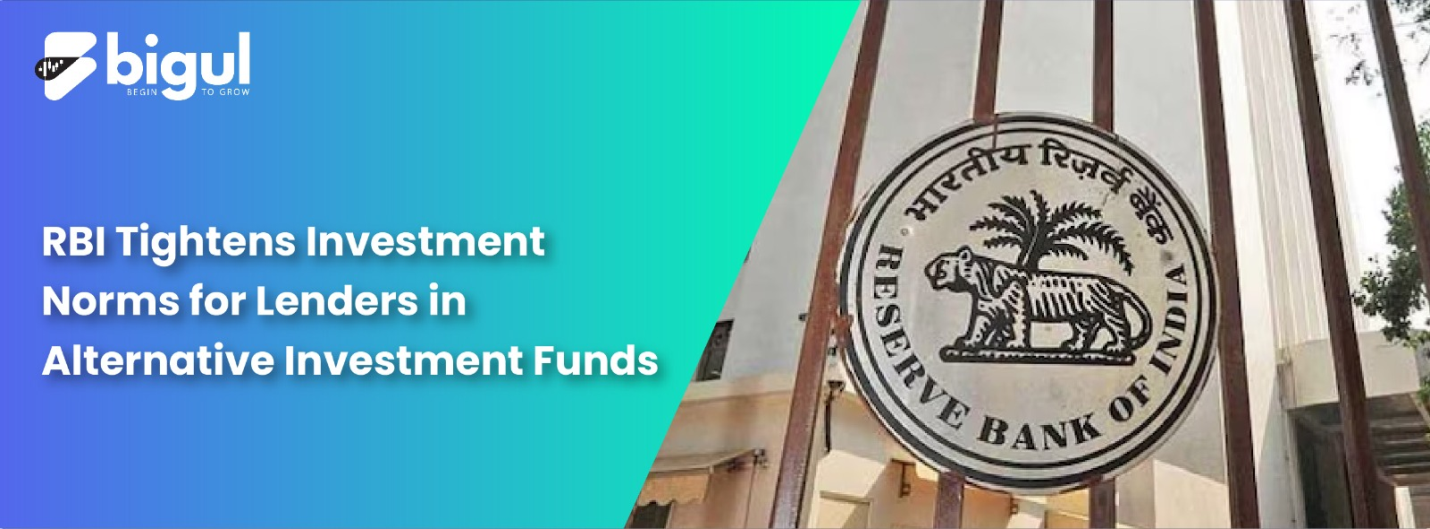Description

Copyright infringement not intended
Picture Courtesy: bigul.co
Context: The Reserve Bank of India (RBI) has issued new directives to banks and non-banking financial companies (NBFCs) regarding their investments in Alternative Investment Funds (AIFs).
Key points of the directives
The RBI's Objective:
- The directive aims to tighten oversight and mitigate risks associated with certain investment structures, potentially preventing evergreening or other financial vulnerabilities. Financial institutions must ensure compliance by reviewing and restructuring existing investments within the given timelines.
Restrictions on Investments in AIFs with Downstream Investments
- Banks and NBFCs are prohibited from making investments in AIFs that have downstream investments, either directly or indirectly, in a debtor company of the bank. The term "debtor company" refers to any company to which the regulated entities (banks and NBFCs) currently have or previously had a loan or investment exposure within the preceding 12 months.
Addressing Evergreening Concerns
- The RBI aims to address concerns related to "evergreening" through this route. Evergreening typically involves extending new credit to borrowers to cover their interest payments on existing debts.
Regulatory Concerns on Certain Transactions
- The RBI has noted certain transactions where regulated entities substitute direct loan exposure to borrowers with indirect exposure through investments in units of AIFs. The notice suggests that such transactions may raise regulatory concerns.
Liquidation of Investments
- If a bank or NBFC is already invested in an AIF that makes a downstream investment in a debtor company, the bank must liquidate its investment in the AIF within 30 days from the date of such downstream investment or within 30 days from the date of the circular, whichever is applicable.
Provision and Capital Deduction
- If banks or NBFCs are unable to liquidate their investments within the prescribed time limit, they are required to make 100% provision on such investments. Additionally, investments by banks in the subordinated units of any AIF with a 'priority distribution model' shall be subject to full deduction from the bank or NBFC's capital funds.

Alternative Investment Funds (AIFs)
- Alternative Investment Funds (AIFs) in India are a category of pooled investment funds regulated by the Securities and Exchange Board of India (SEBI).
- AIFs are distinct from traditional mutual funds and are designed for sophisticated investors seeking higher returns and willing to take on higher risks.
Types of AIFs
- Category I AIFs: These include funds that invest in startups, early-stage ventures, social ventures, SMEs, infrastructure, or other sectors as specified by SEBI. These funds get certain tax benefits.
- Category II AIFs: This category includes funds that don’t fall under Category I or III and are not leveraged or employ complex trading strategies. Private equity, debt funds, real estate funds, etc., fall under this category.
- Category III AIFs: Hedge funds and funds using complex trading strategies for short-term returns come under this category. They can use leverage and derivatives extensively.
Features
- SEBI regulates AIFs to ensure investor protection and market stability.
- AIFs cater to sophisticated investors like high net-worth individuals, institutional investors, and certain qualified individuals or entities.
- AIFs typically involve higher risks compared to traditional investment avenues like mutual funds.
- They can be structured as trusts, companies, or limited liability partnerships (LLPs).
- Minimum investment amounts for AIFs are generally higher than mutual funds, making them accessible primarily to affluent investors.
- AIFs might have lock-in periods, restricting withdrawal or redemption for a specified duration.
Benefits
- AIFs offer exposure to diverse asset classes and investment strategies.
- Due to their focus on alternative assets, AIFs aim for higher returns compared to traditional investment options.
- They are managed by experienced fund managers and professionals specializing in alternative investments.
Challenges
- AIFs involve higher risks due to their investment in alternative and less liquid assets.
- Many AIFs have lock-in periods, limiting investors' ability to withdraw funds.
- Frequent regulatory changes can impact the functioning and structure of AIFs.

Conclusion
- Investing in AIFs in India involves risks due to the nature of alternative investments, which can be less liquid and more complex than traditional investments. However, they also offer opportunities for diversification and potentially higher returns. SEBI regularly updates and amends regulations to ensure transparency, investor protection, and proper functioning of AIFs in the Indian market. Investors considering AIFs should carefully assess the fund's strategy, track record, fees, and risk factors before investing.
Must Read Articles:
ANGEL TAX: https://www.iasgyan.in/daily-current-affairs/angel-tax-29
|
PRACTICE QUESTION
Q. What are the primary regulatory functions performed by the Securities and Exchange Board of India (SEBI) within the Indian financial market, and how do these functions contribute to investor protection and market stability?
|













